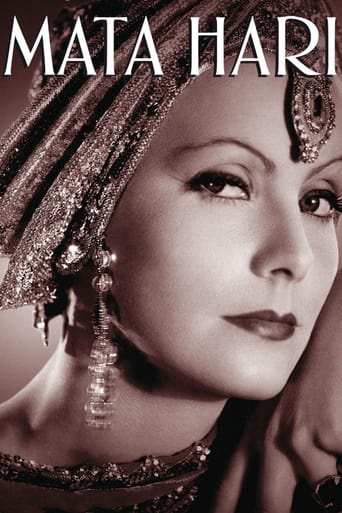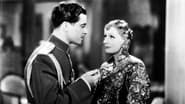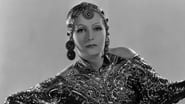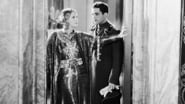drjgardner
I'm not a big fan of Garbo in general, and her talkies specifically. Her acting was more suited to the silent era, and this film, an early talkie, has a lot of silent film elements as well as silent film stars like Ramon Navarro and Lewis Stone. In fact, for 1931, this was an all star cast. Garbo herself had just been nominated for an Oscar for "Anna Christie" (1930), Stone was nominated for "The Patriot" (1930) and was in the highly popular "Big House" (1930), and the great Lionel Barrymore got his only Oscar for "A Free Soul" (1931). Navarro was still popular, though his best days were behind him.Considering how many great films occurred in 1931 (e.g., "Frankenstein", "Cimarron", "City Lights", "Dracula", "The Champ", "M", "Public Enemy", "Dr. Jekyl and Mr. Hyde", "Monkey Business"), this is clearly a 2nd tier film though it was a big commercial success at the time.
lugonian
MATA HARI (Metro-Goldwyn-Mayer, 1931), directed by George Fitzmaurice, is more of a showcase for Greta Garbo in the title role rather than a biographical study on the legendary female spy of World War I. Having already played a lady spy in the silent melodrama, THE MYSTERIOUS LADY (MGM, 1928), this particular stature and situations that occurred are nothing new here. By contrast, from fictional to actual character portrayed, this is a somewhat improved story overall, scripted by Benjamin Glazer and Leo Birinski, and highlighted by interesting casting of Mexican actor, Ramon Rovarro, in support.Opening title: "In 1917, war-ridden France dealt summarily with traitors and spies." Traitors and spies are demonstrated in the opening scene as DuBois (C. Henry Gordon), chief of the spy bureau, gives orders at the firing squad the execution of three traitors, the third being a condemned man (Mischa Auer) refusing to reveal any information about a notorious woman, Mata Hari, who happens to be a great threat to France. Mata Hari, a spy working under secret orders for Adriani (Lewis Stone), is known for hypnotizing and seducing military officials for secretive information, and DuBois's mission is to gather enough evidence to have her arrested and executed. DuBois suspects General Serge Shubin (Lionel Barrymore) to be involved with Mata Hari, but, too, is unsuccessful in gathering evidence against him as well. After getting together with his friend, Lieutenant Alexis Romanoff (Ramon Novarro) of the Russian Interior Air Corps, Serge invites him to come to the café and watch an exotic dancer perform. The dancer is Mata Hari (Greta Garbo). Although Serge is romantically involved with Mata Hari, Alexis becomes interested and soon involved with her, causing friction on their friendship after Alexis finds Mata Hari alone in Serge's apartment. Her seductive ways has Alexis falling under her spell again, enough lose the important documents entrusted to him meant for the Prime Minister over to Mata Hari. After Alexis becomes blinded in an airplane accident, Mata Hari, realizing her love for Alexis, puts herself in great danger for betraying Adriani, committing murder and having DuBois hot on her trail.The screen version, reportedly loosely based on Mata Hari herself, is no doubt tailor made for Garbo's talents as well as MGM's answer to Marlene Dietrich's fictional World War seductive female spy of X-27 in DISHONORED (Paramount, 1931). Faster paced than her previous early sound efforts (1930-31), Garbo appears much more relaxed in the role and very much accustomed to the new medium of "talking pictures" by this point. MGM reliables of Lionel Barrymore and Lewis Stone (both of whom became standard players in many Garbo films over the years) add to the amiable support, along with the Mexican-born Novarro playing a Russian pilot. Somehow Novarro does better than expected, without making any attempt speaking with a Russian accent. Being the only pairing of Garbo and Novarro, MATA HARI turns out to be the only Novarro film produced during his MGM sound years (1929-1934) to have any distinction. His mustache, dark hair and fleecing eyes in one scene come as a reminder of another popular MGM leading man, John Gilbert, who might have tackled the role of Alexis had it not been for his lack of successful box office appeal he once earned in the mid twenties. Others in fine support are Karen Morley playing Carlotta, the dark-haired spy working under orders of Adriani; Alec B. Francis as Major Caron; Blanche Frederici and Helen Jerome-Eddy briefly appearing as Nuns; Frank Reicher as the Cook/Spy; and Edmund Breese (The Warden).Notable scenes worth mentioning include Mata Hari getting Alexis to make passionate love to her. Before he does, she alluringly talks him into proving his love for her by turning out the continuous burning candle of the Holy Lamp of Madonna (a patron saint to guard him from evil); and the stalking of Mata Hari by Jacque, a club-footed giant (face unseen). Of the many major MGM feature film releases of 1931, this and THE CHAMP starring Wallace Beery were once notable exceptions as those to have continued revivals on broadcast television in the New York City area through the mid to late 1980s before making its way to cable television, notably Turner Network Television (1988-92) and Turner Classic Movies (1994-present). Distributed on video cassette and later to DVD, MATA HARI continues to become one of the most notable and worthwhile Greta Garbo films, along with "Queen Christina"(1933), "Anna Karenina"(1935), "Camille" (1936) and "Ninotchka" (1939) all of which she was born to play. As much as the Novarro films from this period are virtually forgotten to today's generation, his legend rests simply on his silent screen performances of both BEN-HUR (1925) and THE STUDENT PRINCE (1927), along with the one notable movie where he was "just wild about Hari." (***1/2)
earlytalkie
Audiences today have largely not heard of Greta Garbo, who was the queen of MGM from the silent days up until the time she made her last film in 1941. Her beauty was unrivaled with the possible exception of Marlene Dietrich, to whom she was often compared. "Mata Hari" tells the true story of the WW1 spy who conquered all with her feminine wiles. Garbo is beautifully costumed and superbly photographed in this film, which shows why MGM was at the head of their game even in the early-talkie era. Lionel Barrymore plays a good part in this and Ramon Navarro (who was gay in real life) plays his love scenes with the proper amount of nostril-flaring that went with the Latin-lover image he had fostered. (Although here he plays a Russian, or Rus-si-an, as Garbo pronounces it.) A fun movie that flies by fast.
netwallah
In the early scenes Mata Hari (Greta Garbo) dances a slinky oriental dance; it's not clear what sort of culture she is meant to represent—there are silver pagodas on her head, and a many-armed god in the background, as well as other orientalist culture indicators sprinkled throughout. It's enough that she's exotic, without needing to pin her nationality down. Her costumes are gorgeous and also vaguely oriental, but with much silver lamé. She wears hats. It's Paris during WW I, and there are spies all over the place, and she's the most independent and fearless of them all, cool and heartless, using men easily, as she does General Shubin (Lionel Barrymore), until she meets the handsome young Russian aviator Rosanoff (Ramon Navarro), who has excellent posture, melty eyes, and a Spanish accent. Navarro is all pleasing surfaces. In the course of being irresistible, she steals secrets from him and accidentally falls in love. This causes problems, she has to kill Shubin to protect Rosanoff, and she has to part with the aviator. His plane crashes, but she finds him when he is blinded in hospital and tells him sweet lies, and she protects him in court and faces the firing squad. The movie is purely a Garbo vehicle, and she is fine, breezing through the clichés and the bad writing, and acting cool and then passionate. She is, of course, compellingly lovely. When she is not dancing, she moves sinuously, mostly. She has an odd carriage when walking slowly through a room, leading with her head bent forward, her neck arched, her shoulders one or two inches from a shrug. Otherwise she reclines langorously and gazes at other characters with a smile impossible to read.









